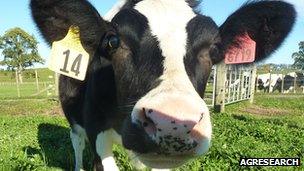GM cows make 'low allergy' milk
- Published

A genetically modified cow that produces milk less likely to cause allergic reactions has been engineered by New Zealand scientists.
Up to 3% of infants are allergic to cows' milk in their first year of life.
The modified cow produced milk without beta-lactoglobulin - a whey protein to which some people are allergic.
The study has been labelled a "milestone" by one scientist, but some campaign groups say it raises ethical concerns.
There are important differences between a woman's breast milk and cows' milk, such as beta-lactoglobulin, which is found in milk from cows but not people.
The researchers, at AgResearch and the University Waikato in New Zealand, said: "It is not surprising that is constitutes a major milk allergen."
Interference
The instructions for making the beta-lactoglobulin protein are contained in genes in the cow's DNA.
The scientists added extra genetic material to disrupt the manufacturing process using a technique called RNA interference.
The resulting calf was born without a tail, however, the researchers say that is "unlikely" to be because of the genetic modification.
It has not yet become pregnant and produced milk normally so the scientists used hormones to jump-start milk production.
Writing in the journal Proceedings of the National Academy of Sciences, the researchers said: "All milk samples from the transgenic calf were devoid of any detectable beta-lactoglobulin."
They concluded the technique was an "efficient tool" for modifying livestock.
Prof Keith Campbell, from the University of Nottingham, who was part of the team that cloned Dolly the sheep said the test would be how long the genetic modification would last.
He said the researchers would need to show the effect lasted throughout the lifetime of each cow and was passed on through several generations.
He added: "It's very interesting and its another way of showing the technology can be pushed forward with potentially useful outcomes.
"There are zero risks in my opinion. If it was poisonous, the animal would be dead."
Bruce Whitelaw, a professor of animal biotechnology at the University of Edinburgh, said: "This is notable since it represents one of the few RNA interference success stories in mammals.
"RNA interference has a long history of successful application in diverse species from plants to worm - this is the first spectacular report for livestock.
"Time will tell how widely applicable RNA interference will be in GM livestock - but this is certainly a milestone study in this field."
Pete Riley, from the group GM Freeze, said: "Before this goes any further, they need to establish what the cause of the defect in the calf was, as there is a possible link to the GM approach."
He said the depth of understanding about the role of genes and how they interact was too weak and that more basic research still needed to be done.
"We can learn a lot by looking at less complicated organisms than cattle," he said.
- Published2 May 2012
- Published19 May 2012
- Published2 August 2010
- Published12 May 2011
- Published27 July 2010
- Published20 November 2006
- Published4 January 2011
- Published19 September 2012